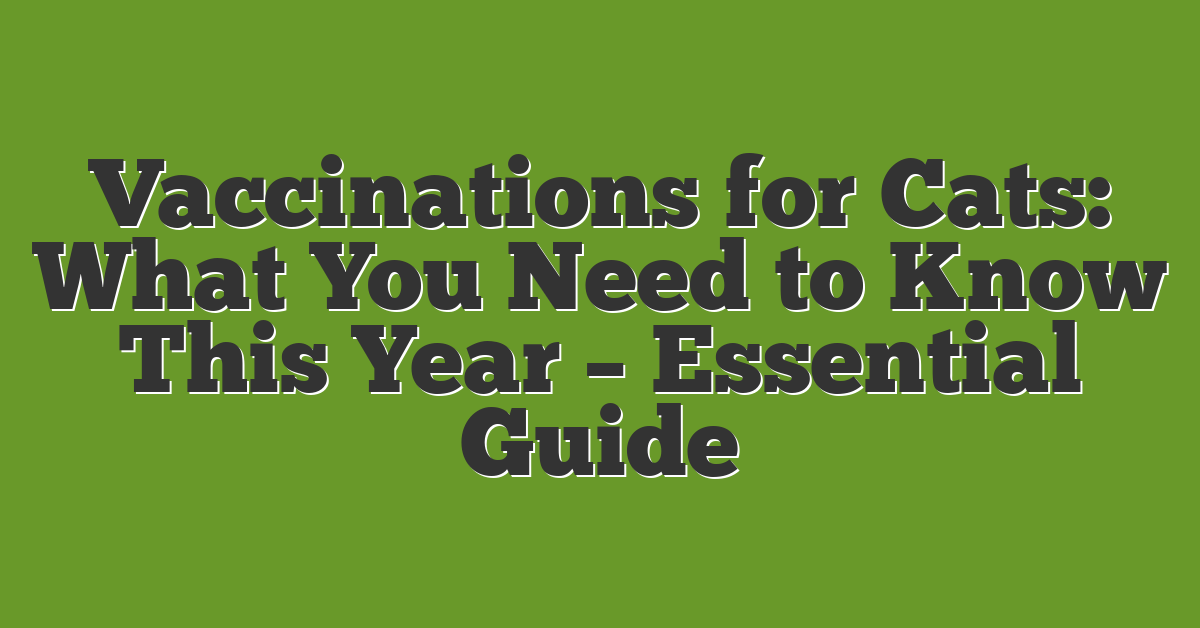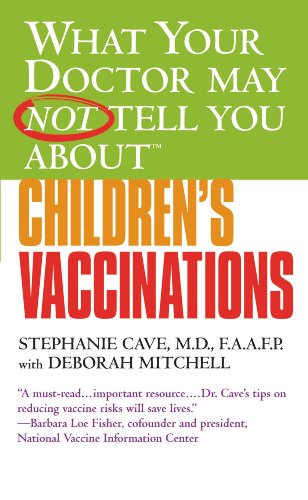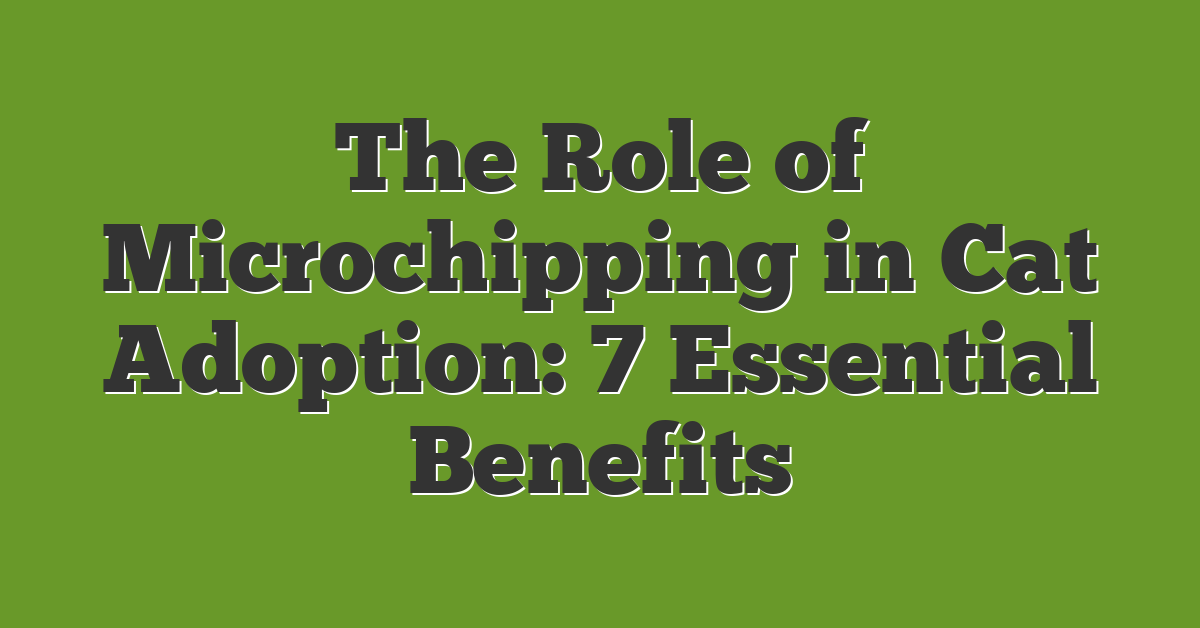As a cat owner, you want to keep your furry friend healthy and happy. Vaccinations play a crucial role in preventing serious illnesses and ensuring your cat lives a long, vibrant life. This year, there are some important updates and essential information you should know about vaccinations for your feline companion.

Keeping up with your cat’s vaccination schedule might seem daunting, but understanding the basics can make it easier. From core vaccines that every cat needs to optional ones based on your cat’s lifestyle, we’ll help you navigate the options to make informed decisions. Let’s explore what you need to protect your beloved pet this year.
Importance Of Vaccinating Your Cat
Vaccinating your cat keeps them healthy and protects them from serious diseases. Core vaccines are essential for all cats. These include rabies, feline herpesvirus, and calicivirus. They prevent illnesses that can be life-threatening.
Optional vaccines depend on your cat’s lifestyle. If your cat goes outdoors, vaccines like feline leukemia are important. Indoor cats might need fewer vaccines, but some protection is still necessary.
Vaccinations also help prevent the spread of diseases to other cats. This community protection reduces the risk of outbreaks. Keeping your cat up-to-date with vaccines ensures they live a longer, happier life.
Regular vaccinations can save you money on costly treatments. Preventing diseases is easier and cheaper than treating them. Visit your veterinarian regularly to maintain your cat’s vaccination schedule.
By vaccinating your cat, you show your love and commitment to their well-being. It’s a simple step that makes a big difference in their health and longevity.
Core Vaccinations For Cats
Keeping your cat up-to-date with core vaccinations ensures their health and longevity. These vaccines protect against common and serious diseases every cat should receive.
Feline Herpesvirus
Feline herpesvirus causes feline viral rhinotracheitis, leading to sneezing, eye discharge, and nasal congestion. Vaccinating your cat prevents these respiratory issues, ensuring they stay comfortable and healthy. If your cat shows symptoms, it’s crucial to consult your vet immediately.
Feline Calicivirus
Feline calicivirus results in upper respiratory infections and oral disease. Vaccination guards against these infections, reducing the risk of sneezing, ulcers, and joint pain. Maintaining your cat’s vaccination schedule helps minimize these painful symptoms and keeps them active.
Rabies
Rabies is a fatal virus transmitted through bites from infected animals. Vaccinating your cat against rabies protects them from this deadly disease and complies with local laws. Ensuring your cat receives their rabies shot also safeguards your family and community from potential outbreaks.
Non-Core Vaccinations
Non-core vaccinations protect your cat based on their lifestyle and environment. These vaccines help prevent diseases that may not affect every cat but are important for specific situations.
Feline Leukemia Virus
Feline Leukemia Virus (FeLV) vaccine guards against a serious disease that weakens your cat’s immune system. It’s essential if your cat roams outdoors or interacts with other cats. FeLV spreads through close contact, so vaccination reduces the risk of infection and related health issues.
Other Optional Vaccines
Other optional vaccines cater to your cat’s unique needs. Examples include:
- Feline Immunodeficiency Virus (FIV): Protects against a virus that compromises the immune system.
- Bordetella: Prevents a bacterial infection that causes respiratory issues.
- Chlamydia felis: Guards against an infection that causes eye and respiratory problems.
Consult your veterinarian to determine which optional vaccines are right for your cat based on their lifestyle and health.
Vaccination Schedule For Cats
Following a vaccination schedule ensures your cat stays healthy all year round. Start vaccinations when your kitten is between 6 to 8 weeks old. Kittens receive a series of shots every 3 to 4 weeks until they are 16 weeks old. Adult cats need booster shots regularly to maintain immunity.
Core Vaccines
Core vaccines are essential for every cat. These include:
- Rabies: Given at 12 weeks, then every 1 to 3 years.
- Feline Herpesvirus (FHV): Administered during kitten stage, with boosters as needed.
- Feline Calicivirus (FCV): Given alongside FHV, similar schedule.
Optional Vaccines
Optional vaccines depend on your cat’s lifestyle:
- Feline Leukemia Virus (FeLV): For outdoor cats or those with other cats.
- Feline Immunodeficiency Virus (FIV): Recommended if your cat is at risk.
- Bordetella: Essential for cats in boarding facilities.
- Chlamydia felis: Useful for cats with respiratory issues.
Annual Check-Ups
Schedule annual vet visits to review your cat’s vaccination needs. Your veterinarian can adjust the schedule based on your cat’s health and environment.
Example Vaccination Table
| Age | Vaccine | Frequency |
|---|---|---|
| 6-8 weeks | FHV, FCV | Initial series |
| 12 weeks | Rabies | First dose |
| 16 weeks | Final FHV, FCV doses | Final kitten dose |
| 1 year | Rabies, FeLV (if needed) | Annual booster |
| Every 1-3 years | Rabies, Core Boosters | As recommended |
Following this schedule helps protect your cat from serious diseases and keeps them happy and healthy.
Potential Risks And Side Effects
While vaccinations keep your cat healthy, they can sometimes cause side effects. Most are mild and go away on their own.
Common Side Effects
- Injection Site Reactions: Swelling, redness, or tenderness where your cat was injected. These usually clear up within a few days.
- Lethargy: Your cat might feel sleepy or less active after getting vaccinated. This typically lasts one day.
- Reduced Appetite: It’s normal for your cat to eat less for a day or two after vaccination.
Rare Side Effects
- Allergic Reactions: Signs include itching, swelling, vomiting, or difficulty breathing. Contact your vet immediately if you see these.
- Fever: A mild fever can develop after vaccination and usually lasts a day or two.
- Behavior Changes: Some cats may become irritable or show signs of discomfort after their shots.
Managing Side Effects
Most side effects don’t need treatment. Keep your cat comfortable and monitor their behavior. If side effects last longer than a few days or worsen, reach out to your veterinarian.
When to Contact Your Vet
- Severe allergic reactions like difficulty breathing
- Persistent vomiting or diarrhea
- High or prolonged fever
- Any unusual or severe symptoms
By watching for these signs, you can ensure your cat stays safe and healthy after vaccinations.
How To Prepare Your Cat For Vaccination
Preparing your cat for vaccination makes the process smoother for both of you. Follow these steps to ensure your cat stays calm and healthy.
Schedule an Appointment
- Choose the right time. Pick a quiet day when your cat is least likely to be stressed.
- Set a reminder. Mark the vaccination date on your calendar to avoid forgetting.
Visit a Trusted Veterinarian
- Find a reliable vet. Choose a clinic with good reviews and experienced staff.
- Bring your cat’s records. Have vaccination history and any health documents ready.
Keep Your Cat Calm
- Create a safe environment. Use a comfortable carrier with familiar blankets or toys.
- Stay relaxed. Your calm demeanor helps reduce your cat’s anxiety.
Inform the Vet About Health Issues
- Share medical history. Tell the vet about any past reactions or current health problems.
- Discuss medications. Inform the vet of any medicines your cat is taking.
Prepare for Aftercare
- Monitor your cat. Watch for any side effects like swelling or lethargy.
- Provide a quiet space. Let your cat rest in a peaceful area after the vaccination.
Follow Pre-Vaccination Instructions
- Avoid feeding right before. Some vets recommend fasting a few hours before the shot.
- Hydrate your cat. Ensure your cat has access to fresh water before the visit.
By following these steps, you help make the vaccination experience positive for your cat. Staying prepared ensures your feline friend stays healthy and happy.
Conclusion
Keeping your cat up-to-date with vaccinations is a simple step that makes a big difference. It ensures your furry friend stays healthy and happy all year long.
Working with your vet, you can create a plan that fits your cat’s unique needs. Taking this proactive approach shows your love and commitment. Enjoy the peace of mind that comes with knowing you’re giving your cat the best protection possible.













